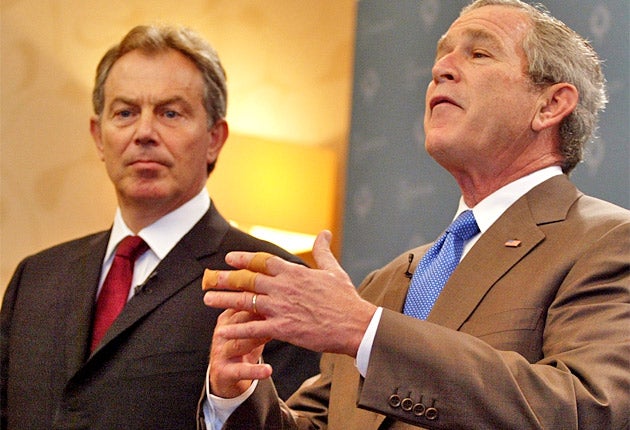Details from Blair's Iraq calls were deleted

Your support helps us to tell the story
From reproductive rights to climate change to Big Tech, The Independent is on the ground when the story is developing. Whether it's investigating the financials of Elon Musk's pro-Trump PAC or producing our latest documentary, 'The A Word', which shines a light on the American women fighting for reproductive rights, we know how important it is to parse out the facts from the messaging.
At such a critical moment in US history, we need reporters on the ground. Your donation allows us to keep sending journalists to speak to both sides of the story.
The Independent is trusted by Americans across the entire political spectrum. And unlike many other quality news outlets, we choose not to lock Americans out of our reporting and analysis with paywalls. We believe quality journalism should be available to everyone, paid for by those who can afford it.
Your support makes all the difference.The questions facing Tony Blair at tomorrow's Iraq inquiry hearing are piling up. It emerged last night that parts of Mr Blair's conversations with the United States President George Bush in the build-up to war were expunged from Whitehall records.
Sir John Chilcot's team also heard yesterday from a senior civil servant that Downing Street ignored Foreign Office warnings over publishing the infamously exaggerated dossiers on the threat from Saddam Hussein's supposed weapons arsenal.
Mr Blair's private secretary at No 10 routinely deleted any mention of his correspondence with Mr Bush from the Government minutes, the inquiry has found out. The disclosure will fuel anger over the failure to release the memos between the two leaders in the run-up to war, which could fill in gaps for when Mr Blair took key decisions over the war. David Cameron, challenged over the refusal to publish the memos, said that he was powerless to order their release.
Mr Blair's then private secretary, Matthew Rycroft, has recalled that Mr Bush often began telephones calls or video conferences in 2002 and 2003 by thanking the former prime minister for his letters.
Mr Rycroft said that he drew up two accounts of the conversations, omitting any reference to them in the Whitehall record because Mr Blair viewed them as "personal dialogue". He told the inquiry: "I do recall doing it on a number of occasions. I would have thought possibly about five occasions and each time for a particular reason.
"I recall the choice I had was either only doing an expurgated version or doing two versions, and so on these occasions I decided it was better to do two versions." Mr Rycroft said Mr Blair had always been clear that Britain would support US military action.
Sir John Scarlett, the former chairman of the Joint Intelligence Committee, used similar language in details of evidence also released yesterday. Asked whether he urged ministers to give the Iraq weapons inspectors more time, he replied: "We were being bulldozed... by the military timetable which pointed very strongly to early or mid-March."
John Williams, the former head of news at the Foreign Office, said that, in retrospect, his department had been marginalised. He was under the "illusion that the Foreign Office was playing a more important role in Iraq policy than I now believe to be the case" and viewed efforts to reach a diplomatic solution through the United Nations as "peripheral".
Mr Williams said he opposed publication of the September 2002 dossier, which claimed Saddam could launch a weapons strike within 45 minutes, but Mr Blair went ahead anyway.
And he "strongly argued" at a meeting chaired by Alastair Campbell, the No 10 director of communications, against what became known as the "dodgy dossier" of February 2003. He said: "I believed I had won the argument, only to hear the decision had been reversed."
Join our commenting forum
Join thought-provoking conversations, follow other Independent readers and see their replies
Comments